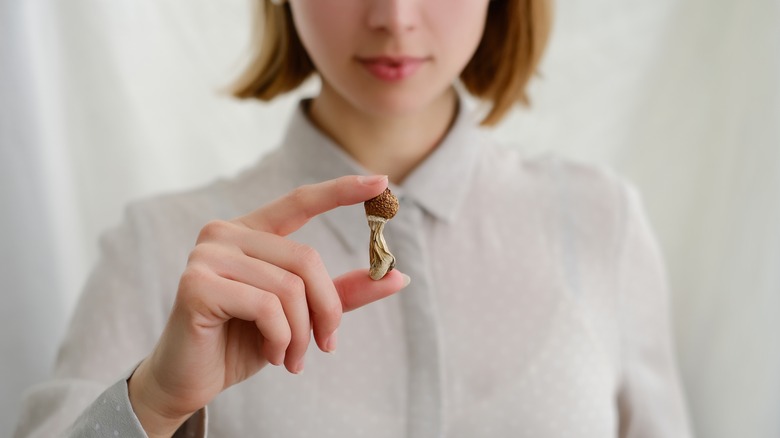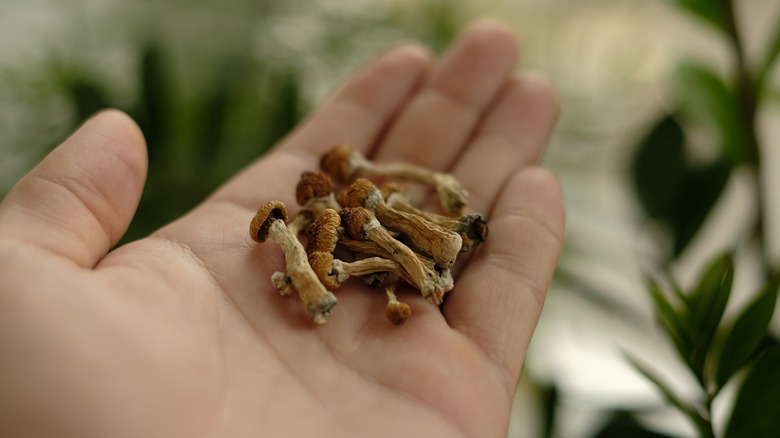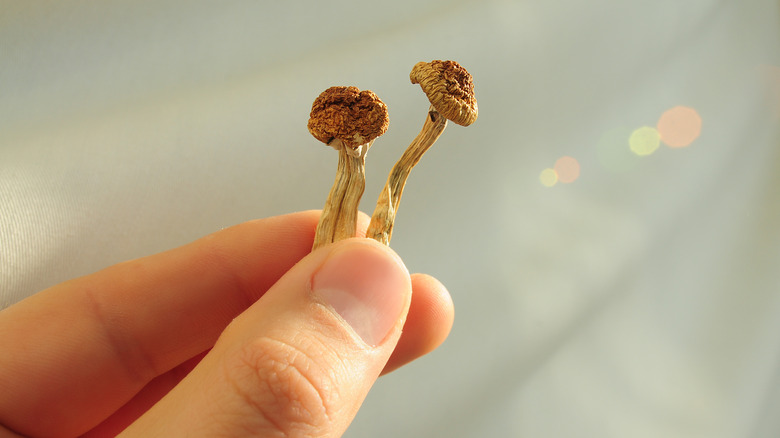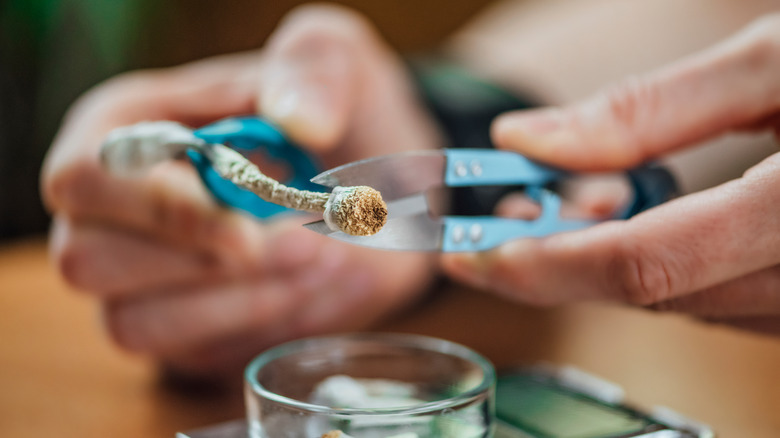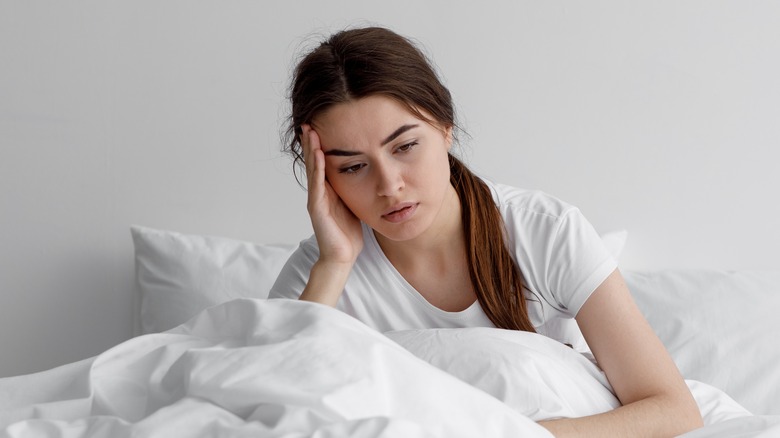Expert Breaks Down Everything To Know About Microdosing Psychedelics For Your Mental Health - Exclusive
We know of a wide range of mental health problems, with some of the most common being depression, generalized anxiety disorder, bipolar disorder, and OCD. However, the complete list is much more extensive. Thankfully, several treatments for mental health issues are available, including therapy, oral medications, support groups, and even treatment programs. Again, the full list is much longer, and these treatments are what many individuals turn to in order to help resolve or manage their mental health. However, other alternatives have begun to bubble to the surface in recent years, with some creating quite the buzz.
When you think of mental health treatments, your mind may flicker to images of oral tablets or therapy. However, speculation is growing that psilocybin — better known as "magic mushrooms" — could be a potential treatment for a plethora of mental health problems. In fact, many women have been dabbling in the practice for quite some time. While it may seem strange, the buzz surrounding this potential treatment is undeniable. We tapped in with licensed therapist Dr. Peter H. Addy, Ph.D., to exclusively discuss the hype around microdosing and see if it's worth raving about.
Microdosing is gaining traction in some states
Studies on microdosing with psilocybin have been steadily increasing, particularly in recent years. This increase in studies also aligns with its growth in popularity, which has been covered extensively in several publications. Although microdosing with psilocybin is gaining traction both privately and publicly, there is still reason to be cautious. In an exclusive interview with Women.com, Dr. Peter H. Addy, Ph.D., explains, "Psilocybin is not legal in any state. There is no way to purchase psilocybin gummies legally."
Despite this, many women are still managing to try it out for themselves, and some states are even working towards legalizing it. Tom Eckert, co-author of the Oregon Psilocybin Therapy Ballot Measure, told Scientific American, "Our goal was to move psilocybin out of the medical framework so we could provide access to anyone who might safely benefit."
So what's causing this rise in popularity? While it's not exactly clear, we can certainly speculate. As studies accumulate, they're increasingly showing evidence that psilocybins could potentially have the ability to treat a variety of mental health problems, with many participants in microdosing studies "[reporting] improved mood, concentration, creativity, and compassion," according to Dr. Addy. More specifically, he adds, "People who microdose say that it helps with mood, specifically anxiety, and depression." These attractive benefits may explain why many women view the treatment as a natural way to treat ailments such as anxiety.
Microdosing uses small amounts
Many individuals try microdosing for its beneficial impacts on mental health. However, what does the term even mean? As it turns out, it's quite specific. Dr. Addy breaks it down exclusively to Women.com in simple steps: "[A microdose is] about one-20th of a regular dose. That comes to about 100-200 milligrams of dried mushroom fruiting body." While this is more of a general measurement, he also adds, "Each person is different, and also each batch of mushrooms is different. If two people each take the same 200 mg of mushrooms from the same batch, one person might have a more substantial experience due to differences in body chemistry." This is essential to remember if you're considering microdosing, as you'll need to think about what your body can handle. Usually, it's best to start with a small amount.
However, if you get it right, it may just pay off. For many women, microdosing has helped them tackle their mental health head-on. Psychotherapist Jennifer Gural told MIT Technology Review that microdosing has had a positive effect on her own life, saying, "It shifted the focus of my life. It really helped me to tackle how my brain works and how I was thinking." This example is just one of several fascinating cases of how the treatment is helping people, despite not yet being legal. So how can you go about microdosing safely? Fortunately, it's not too difficult.
Find what works for you
If you want to try microdosing, then you should make sure that you do it in a safe and controlled way. Naturally, this involves figuring out what works best for you. While it may seem overwhelming initially, there are some great tips you can follow to start. Speaking exclusively to Women.com, Dr. Addy explains, "The most common procedure is to microdose every third day for 30 days, so you take a dose in the morning on day 1, nothing for days 2 and 3, and microdose again on day 4, etc." When it comes to dosage, a microdose, as mentioned earlier, is likely your best bet. Taking these steps will help you to understand how your body handles a standard microdose, which you can adjust as needed.
Likewise, staying safe is also essential. If you have any unwanted side effects, try lowering or stopping your dose, and speak to a medical professional if you feel it's necessary. You could even go lower than a microdose if you feel that it's beneficial — the choice is yours. However, that's not all. You may find that therapy alongside microdosing is also advantageous. There are several ways you can kickstart your therapy journey, making the whole process a breeze.
Microdosing has some risks
While microdosing with psilocybin has opened up a gateway of potential for treating various mental health problems, it doesn't come without its risks — just like with most mental health treatments. For example, Dr. Addy explains exclusively to Women.com, "Some people report increased anxiety and physical discomfort for a few hours after taking the medicine," while other real-world risks can include "being arrested, fined, imprisoned, or losing work." While these downsides may seem unfair, it unfortunately reflects the current reality across most of the United States. If you're interested in trying microdosing, your best bet is to first discuss it with a medical professional, who will help guide you along the best path.
Looking after and monitoring your mental health is important and can help you to enjoy life to its fullest. There are also ways that you can help people understand your anxiety better if it's something that you particularly struggle with. In the meantime, however, microdosing might provide a whole new option to start you on the path to wellness.
